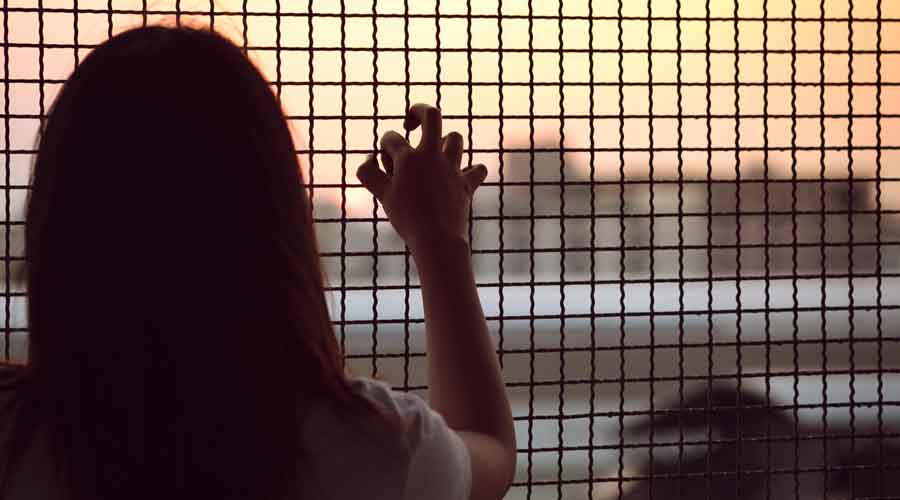The absence of an institutionalised mental health support system at the ground level is hurting trafficking survivors.
A majority of the block primary health centres — usually the first go-to point for villagers in case of a serious medical condition — do not even have a counsellor and a psychologist or a psychiatrist are too far-fetched, activists who work with rescued persons said.
Travelling to a district hospital or one in Kolkata has too many logistical challenges.
Many survivors return to a hostile environment, where they have to fight stigma from family and neighbours. They are trapped in what a psychologist called a “vicious circle of guilt and shame”. Many survivors are vulnerable to anxiety, memory loss, depression, post traumatic stress disorder (PTSD) and often end up in substance abuse.
The Mental Healthcare Act, 2017, recognises trafficked survivors as a group that must receive mental health support and services. But the support will be only on paper unless the government ensures the presence of a mental health expert at block levels, activists said.
On Friday, a handful of trafficking survivors in North 24-Parganas visited a primary health centre in Sibhati block in Basirhat, seeking treatment and counselling for mental health issues. They were allegedly told at the ticket counter that the unit did not have that provision. The survivors stayed back to meet the block medical health officer who iterated that the centre did not have any scope for treatment of mental health problems.
The survivors finally got the officer to write the following lines on an application: “Forwarded to the CMOH, Basirhat as there is no psychiatric doctor”. CMOH refers to the chief medical officer of health in a district.
One of the survivors who visited the centre on Thursday had recently visited a psychiatrist at RG Kar Medical College and Hospital in Kolkata, about 70km away. The OPD opens around 10 am but the queue starts from 8.30 am. To reach the hospital by 8.30 am, the woman had to leave her home in a Basirhat village at 3 am. She had to rent a car to reach Barasat. From there, she took a train to Sealdah. One leg of the trip took over four hours. Though the session was helpful, the trip was so taxing, both physically and financially, that it was her first and last.
“The post-rescue life has its own share of trauma for survivors. Some of them get married in a bid to start a new life. But after a few days, they start getting harassed by their husband and in-laws, who rake up their past... Harassment from neighbours only adds salt to their wounds. Many of them go into depression, some are driven to suicidal tendencies,” said Antara Biswas, programme coordinator with Partners in Anti-Trafficking, a network of NGOs in North 24-Parganas.
She has recently spearheaded a study involving 160 survivors in North 24-Parganas. Eighty-eight respondents said they faced stigma in almost every walk of their lives and needed regular mental health support.
Some survivors seek help from private practitioners, despite their economic conditions. Even a subsidised rate, arranged by NGOs, is unaffordable for them.
Gautam Saha, a psychiatrist, has treated multiple trafficking survivors at his chamber in Barasat.
“Counselling and antidepressant drugs work in most cases. But the treatment is a continuous process. Abrupt halts are not good,” he said.
Saha, the past president of the Indian Psychiatric Society, spoke of a survivor he started treating four months ago. “The woman was being abused by her husband. Before marriage, her brother and his wife called her a bad influence on their children. On the first couple of sittings, the woman would just cry her heart out,” he said.
Pompi Banerjee, psychologist and researcher with Sanjog, an organisation working on intersectional issues of gender, rights, migration and anti-human trafficking, explained how a trafficking survivor had to cope with layers of trauma.
“Studies have shown that a bulk of the survivors hail from economically and socially weaker sections. Many of them face trauma even before being trafficked. In the clutches of the trafficker/s, they are victims of sexual abuse and physical violence on a daily basis. Once rescued, they often face hostilities from police and in shelter homes. After returning home, they have a glimmer of hope which is soon busted by stigma,” Banerjee said.
In South 24-Parganas, Goranbose Gram Bikas Kendra (GGBK), an NGO that works with trafficking survivors, has been instrumental in providing mental health support to survivors at local levels.
A sustained campaign by the NGO led to the presence of counsellors at multiple block primary health centres in the interiors of South 24-Parganas. The office of the NGO also has a counsellor.
“Survivors are referred to a psychiatrist in a sub-divisional hospital as and when needed. They are also helped with free medicines. The efforts have had results. But it has to be done on a much larger scale,” said Subhasree Raptan of the GGBK.
